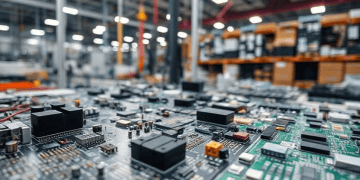The recent announcement by U.S. President Donald Trump regarding new reciprocal tariffs on imports from several countries, including India, has prompted varied responses from stakeholders in India’s electronics manufacturing industry.
While some industry executives believe the tariffs may be subject to future negotiations and unlikely to have long-term effects, others express concern that the move could impact India’s ambitions to become a global electronics manufacturing hub — a development with potential implications for multinational companies like Apple.
Industry Reactions
Atul Lall, Managing Director and CEO of Dixon Technologies, India’s largest contract manufacturer, stated that Indian electronics manufacturing services (EMS) firms are primarily focused on the domestic market, which is expected to remain relatively unaffected. “It’s too early to gauge the full impact on Indian firms,” Lall said, adding that the situation will depend on how companies adapt to the changing trade environment and any bilateral agreements that may follow.
Conversely, Navkendar Singh, Associate Vice-President at IDC India, expressed concern over the potential policy uncertainty. He noted that companies such as Apple, which have expanded manufacturing operations in India, may reconsider their strategies if tariffs remain in place. “This could affect India’s efforts to climb the value chain in the global electronics manufacturing and supply chain,” Singh said.
Potential Impact on Apple
Apple, which began iPhone production in India in 2017, has significantly increased local manufacturing and now exports to several global markets, including the U.S. According to data from the India Cellular and Electronics Association (ICEA), iPhones represented $14.5 billion, or 70%, of India’s smartphone exports as of February. Industry analysts estimate that approximately 15% of those exports go to the U.S., potentially resulting in around $600 million in added tax liability under the new 27% tariff.
Analysts also estimate that if the tariffs continue, Apple may face up to $10 billion in additional costs due to varying import duties from its manufacturing bases, which include China, Vietnam, Brazil, and India. As of now, Apple has not publicly responded to the new U.S. tariffs.
Government and Industry Response
India’s Union Minister for Electronics and IT, Ashwini Vaishnaw, recently noted that Apple operates 64 dedicated assembly plants in the country. Key manufacturers such as Tata Electronics and Foxconn have been integral to Apple’s local production push.
Some analysts believe that the tariffs could lead to global trade negotiations that may reshape current supply chain strategies. A senior analyst at a domestic brokerage firm, speaking on condition of anonymity, said that although most Indian EMS firms have limited direct exposure to the U.S. market, a shift in global supply chain dynamics could still have broader implications for India’s economic goals.
Outlook and Negotiations
Tarun Pathak, Partner and Director at Counterpoint Research, suggested that the current tariffs could lead to new trade discussions and possible adjustments in the coming months. “India’s electronics industry has grown primarily through import substitution. The next step is expanding export capabilities,” Pathak said.
He added that sustained tariffs could hinder this progress unless India and other Asian nations negotiate new bilateral agreements or implement countermeasures.
Risks from Indirect Trade
Ajai Chowdhry, co-founder of HCL Technologies, highlighted concerns about the potential misuse of India as a route for indirect exports from other countries, particularly China. “India should ensure that it is not used as a backdoor in global trade disputes,” Chowdhry said.
As the situation develops, both government and industry stakeholders are closely monitoring the potential long-term effects of the tariffs on India’s electronics manufacturing sector and its position in the global supply chain.
Discover top supply chain news stories at The Supply Chain Report. For international trade resources, head to ADAMftd.com.
#TrumpTariffs #IndiaElectronics #ManufacturingSector #TradePolicyImpact #ElectronicsIndustry #TariffReactions #GlobalTrade















